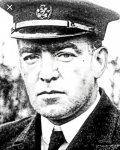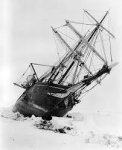- Joined
- Jun 13, 2018
- Messages
- 869
.
I think most people on these forums have heard of Ernest Shackleton, and particularly his Antarctic Expedition of 1914- This was a remarkable story of adversity overcome in multiple near disasters of early 20th century antarctic exploration.
I particularly find his 1914 trans Antarctica attempt entralling for I have this passion for all things early 20th century radio. This was a exciting time of spark gaps and coherer receivers, long long wavelengths- and it was a time when every radio operator was in some degree a radio 'ham.'
***********
" ...........Adventure is just another word for poor planning..... "
Roald Amundsen, (leader of the first success expedition to the geographic South Pole)
************
Shackleton 'story revolves around his ship, the Endurance, becoming frozen in the ice of the Weddell Sea while searching for a path thru that sea ice for a site to land his expedition. Trapped in this ice, his ship was slowly destroyed, forcing everyone's evacuation- and then a harrowing escape across ice and open water to remote Elephant Island. Shackleton made a subsequent small boat voyage to rescue the stranded crew by sailing across the antarctic oceans for help... a sailing feat un-paralelled to this day. But while all this happened the outside world knew nothing.
There are any number of excellent books about his ill fated expedition, and I will leave it the curious to fill in the details.
My interests were piqued when I gave a series of talks to US Naval Academy Midshipmen. These were about early radio communication, mentioning Admiral Byrd and other polar explorations, --I was asked concerning Shackleton's near disaster - "where was his radio ?"
Simple answer, he didn't have one- at least he didn't have a transmitter- he only had a receiver aboard the Endurance. This was post 1912 Titanic - by 1914 the whole maritime world now valued spark as a lifesaving tool. But obviously Ernest didn't, and his ignorance put his expedition in terrible danger when he omitted this invaluable piece of equipment.
This article by John L. Fuhring is a great exploration of Shackleton and his (lack of) wireless-
[/URL]
but it leaves me with this great saying:
".......... the difference between an adventure and a disaster is that in an adventure, nobody gets killed....."
Lauri
.
I think most people on these forums have heard of Ernest Shackleton, and particularly his Antarctic Expedition of 1914- This was a remarkable story of adversity overcome in multiple near disasters of early 20th century antarctic exploration.
I particularly find his 1914 trans Antarctica attempt entralling for I have this passion for all things early 20th century radio. This was a exciting time of spark gaps and coherer receivers, long long wavelengths- and it was a time when every radio operator was in some degree a radio 'ham.'
***********
" ...........Adventure is just another word for poor planning..... "
Roald Amundsen, (leader of the first success expedition to the geographic South Pole)
************
Shackleton 'story revolves around his ship, the Endurance, becoming frozen in the ice of the Weddell Sea while searching for a path thru that sea ice for a site to land his expedition. Trapped in this ice, his ship was slowly destroyed, forcing everyone's evacuation- and then a harrowing escape across ice and open water to remote Elephant Island. Shackleton made a subsequent small boat voyage to rescue the stranded crew by sailing across the antarctic oceans for help... a sailing feat un-paralelled to this day. But while all this happened the outside world knew nothing.
There are any number of excellent books about his ill fated expedition, and I will leave it the curious to fill in the details.
My interests were piqued when I gave a series of talks to US Naval Academy Midshipmen. These were about early radio communication, mentioning Admiral Byrd and other polar explorations, --I was asked concerning Shackleton's near disaster - "where was his radio ?"
Simple answer, he didn't have one- at least he didn't have a transmitter- he only had a receiver aboard the Endurance. This was post 1912 Titanic - by 1914 the whole maritime world now valued spark as a lifesaving tool. But obviously Ernest didn't, and his ignorance put his expedition in terrible danger when he omitted this invaluable piece of equipment.
This article by John L. Fuhring is a great exploration of Shackleton and his (lack of) wireless-
Shackleton's missing radio equipment
My take on a failure of Shackleton to appreciate the value of "modern" radio technology and a description of just what that technology was.
www.geojohn.org
but it leaves me with this great saying:
".......... the difference between an adventure and a disaster is that in an adventure, nobody gets killed....."
Lauri
.





